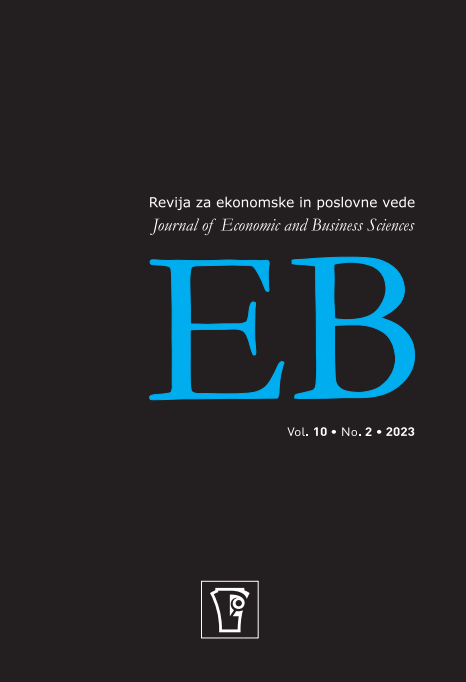Zadovoljstvo pri delu in njegove ključne determinante
DOI:
https://doi.org/10.55707/eb.v10i2.132Ključne besede:
zadovoljstvo pri delu, determinante zadovoljstva pri delu, Nizozemska, odnosi s sodelavci, regresijski modelPovzetek
Članek raziskuje stopnjo zadovoljstva zaposlenih na delovnem mestu in determinante, ki prispevajo k temu, in sicer v organizaciji, ki zajema podjetje in njene podružnice. Študija je sestavljena iz dveh delov: kvantitativne raziskave na podlagi ankete, ki je bila posredovana vsem zaposlenim v organizaciji, in kvalitativne raziskave na podlagi polstrukturiranih intervjujev s šestimi naključno izbranimi zaposlenimi, ki predstavljajo približno tretjino vseh v podjetju. Rezultati kvantitativne raziskave kažejo, da so zaposleni na splošno zadovoljni s svojim delom v organizaciji ter da so najpomembnejši dejavniki, ki prispevajo k temu zadovoljstvu, dobri odnosi s sodelavci ter podporno vodstvo podjetja. Kvalitativna raziskava na podlagi intervjujev prav tako razkriva, da zaposleni resnično cenijo prizadevanja podjetja za spodbujanje občutka skupnosti in ustvarjanje prijateljstev s pomočjo različnih dejavnosti, kot so druženje med podaljšanimi odmori za kosilo ter teambuilding dogodki.
Literatura
Arbour, S., Kwantes, C. T., Kraft, J. M. in Boglarsky, C. A. (2014). Person-organization fit: Using normative behaviors to predict workplace satisfaction, stress and intentions to stay. Journal of Organizational Culture, Communications and Conflict, 18(1), 41-64.
Bass, B. M. in Riggio, R. E. (2006). Transformational leadership. New York: Lawrence Erlbaum Associates, Inc. https://doi.org/10.4324/9781410617095
Dostopno na: https://www.taylorfrancis.com/books/mono/10.4324/9781410617095/transformational-leadership-bernard-bass-ronald-riggio (pridobljeno 10.10.2023)
Brayfield, A. H., in Rothe, H. F. (1951). An index of job satisfaction. Journal of Applied Psychology, 35(5), 307–311. https://doi.org/10.1037/h0055617
Brikend, A. (2011). Job Satisfaction: A Literature Review. Management Research and Practice.
Bunton, S. A., Corrice, A. M., Pollart, S. M., Novielli, K. D., Williams, V. N., Morrison, L.
A. in Fox, S. (2012). Predictors of workplace satisfaction for US medical school faculty in an era of change and challenge. Academic Medicine, 87(5), 574-581. https://doi.org/10.1097/ACM.0b013e31824d2b37
Deci, E. L., Koestner, R. in Ryan, R. M. (1999). A meta-analytic review of experiments examining the effects of extrinsic rewards on intrinsic motivation. Psychological bulletin, 125(6), 627. https://doi.org/10.1037/0033-2909.125.6.627
De Clercq, D., Haq, I. U., Azeem, M. U. in Ahmad, H. N. (2019). The relationship between workplace incivility and helping behavior: roles of job dissatisfaction and political skill. The Journal of psychology, 153(5), 507-527. https://doi.org/10.1080/00223980.2019.1567453
Eisenbeiss, S. A., Van Knippenberg, D. in Boerner, S. (2008). Transformational leadership and team innovation: integrating team climate principles. Journal of applied psychology, 93(6), 1438-1446. https://doi.org/10.1037/a0012716
Dostopno na: https://d-nb.info/1095486128/34 (Pridobljeno 10.10.2023)
Fassoulis, K. in Alexopoulos, N. (2015). The workplace as a factor of job satisfaction and productivity: A case study of administrative personnel at the University of Athens. Journal of Facilities Management, 13(4), 332-349. https://doi.org/10.1108/JFM-06-2014-0018
Grivec, M. (2014). Etika u računovodstvu. Praktični menadžment: stručno-znanstveni časopis za teoriju i praksu menadžmenta, 5/2, str. 1722.
Hira, T. K., in Loibl, C. (2005). Understanding the impact of employer‐provided financial education on workplace satisfaction. Journal of Consumer Affairs, 39(1), 173-194. https://doi.org/10.1111/j.1745-6606.2005.00008.x
Haar, J. M., Russo, M., Suñe, A. in Ollier-Malaterre, A. (2014). Outcomes of work–life balance on job satisfaction, life satisfaction and mental health: A study across seven cultures. Journal of vocational behavior, 85(3), 361-373. https://doi.org/10.1016/j.jvb.2014.08.010
Halkos, G. in Bousinakis, D. (2010). The effect of stress and satisfaction on productivity. International Journal of Productivity and Performance Management. 59. 415-431. https://doi.org/10.1108/17410401011052869
Judge, T. A. idr. (2010)"The relationship between pay and job satisfaction: A meta-analysis of the literature." Journal of vocational behavior 77.2: 157-167. https://doi.org/10.1016/j.jvb.2010.04.002
Locke, E. A. (1969) "What is job satisfaction?." Organizational behavior and human performance 4.4: 309-336. https://doi.org/10.1016/0030-5073(69)90013-0
Dostopno na: https://www.libs.uga.edu/reserves/docs/scans/job%20satisfaction.pdf (Pridobljeno 10.10.2023)
Lee, R. in E. R. Wilbur (1985). Age, education, job tenure, salary, job characteristics, and job satisfaction: A multivariate analysis." Human Relations 38.8: 781-791. https://doi.org/10.1177/001872678503800806
Moorman, R. H. (1993). The influence of cognitive and affective based job satisfaction measures on the relationship between satisfaction and organizational citizenship behavior. Human relations, 46(6), 759-776. https://doi.org/10.1177/001872679304600604
Yazdani, N., Murad, H. S. in Shuja, A. (2017). Wholistic Management Education (WME): Theorizing the Contextualized Applicability of Transformative Learning in Management Education Discourse. Sukkur IBA Journal of Management and Business, 4(1), 42-63. https://doi.org/10.30537/sijmb.v4i1.103
Spector, P. E. (1985). Measurement of human service staff satisfaction: Development of the Job Satisfaction Survey. American journal of community psychology, 13(6), 693. https://doi.org/10.1007/BF00929796
Wanous, J. P. in Lawler, E. E. (1972). Measurement and meaning of job satisfaction. Journal of applied psychology, 56(2), 95. https://doi.org/10.1037/h0032664
Prenosi
Objavljeno
Kako citirati
Številka
Rubrike
Licenca
Avtorske pravice (c) 2023 Justin Luka Poličar, Žiga Čepar

To delo je licencirano pod Creative Commons Priznanje avtorstva 4.0 mednarodno licenco.





